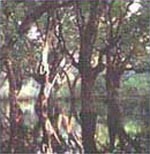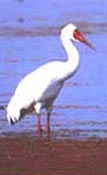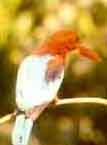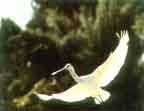| |
|
|
General
information
|
|
Total
Area
|
:
|
28.73
sq kms
|
|
Best
time to visit
|
: |
Throughout the year.
Breeding season : Aug-Oct
Migrants : Oct-Feb.
|
|
Accommodation
|
: |
|
|
Nearest
Town
|
: |
Bharatpur
|
|
How
to get there
|
: |
Rail-Bharatpur (2 km)
Air-Agra (50 km), Air-jaipur(176 kms)
Air-Delhi (176 kms)
|
|
Species
found
|
: |
Siberian
crane, cormorant, stork, spoon bill,
quail, coot, heron,
teal, tern, sambar, chital,blackbuck,
wild boar,civet etc.
|
|
More information
|
: |
Keoladeo Ghana National Park, Bharatput,Rajasthan.
|
|
|
Just
176 kms from Delhi is a very special wilderness - the Keoladeo
Ghana National Park, one of the finest water-bird sanctuaries
in the world. The lake and wetland was artificially created
by the Maharaja of Bharatpur in the 19th century. By building
small dykes and dams and diverting water from an irrigation
canal, he converted this low lying area into a fine wild fowl
shooting preserve. In a few years, the new wetland surrounded
by marginal forests was able to support thousands of water
birds.
|
| |
 Kadam
Kunj, Keoladeo
Kadam
Kunj, Keoladeo |
Commonly
referred to as Bharatpur, the Park is a delight for bird watchers.
Over 375 species of birds are found here and raised paths,
camouflaged by babul trees and undergrowth make viewing easy.
A quiet ride by boat in the early hours of the morning is
also un unforgettable experience. There fare mixed heronries
on the half submerged babul trees and the cacaphony is unbelievable
as painted storks, open bills, spoon bills, egrets, comorants,
white ibis and multitudes of others, tend their young. Jacanas
with their iridescent colours and elegant tail feathers and
purple moorhen can be seen delicately treading over the floating
vegetation.
|
| |
|
|
Every
year Bharatpur waits with bated breath for the arrival of
the Siberian cranes. There are only two wintering places for
this rare species one in Iran and the other Bharatpur and
these beautiful birks with their distinctive red beaks and
facial patches, fly over 6400 kms from their summer retreats
in Siberian cranes with a young one made an appearance in
Bharatpur after a lapse of three years.
|

Siberian Crane |
| |
|
 Common
Kingfisher
Common
Kingfisher |
Colourful
kingfishers, graceful pelicans rare Siberian cranes and trans-
continental fliers- the migratory water - fowl are amongst
the 375 species of birds found in the Keoladeo National Park.
The most spectacular nesting is that of the egrets, storks,
herons and cormorants which make over 10,000 nests every year.
This makes outstanding bird havens of the world.
The
park covers an area of 28.73km.
|
|
|
The
story of Bharatpur Bird Sanctuary is incomplete without
an account of the migratory waterfowl. The most prominent
water fowl coming to this park are bareheaded and greylag
geese. Ducks also create a lot of fluttering in the lakes.
The
ducks usually found here are pintail, widgeon, common shelduck,
shoveler, garganey, teal, mallard pochard etc.
|

White breasted kingfisher
|
| |

Spoonbill
in flight |
Attracted
by the influx of the water fowl the predatory birds-tawny
eagles, spotted eagles short-toed eagles imperial eagles
and fishing eagle also arrive. They all forms the apex
of the biological pyramid of the sanctuary and complete
the avian food chain of the ecosystem. There are large
herds of the nilgai, chital, wild boar and fear cows in
addition to a few herds of sambar.
|
Keoladeo
National Park is open to visitors throughout the year , but it
is more rewarding to visit it between August to end of March.The
best way to see the park is on foot. Other options available are
to see it on cycle or a cycle rickshaw. Both are available on
hire. Cycle rickshaw pullers have been trained by the forest department
in bird watching and are knowledgeable. Boats are also availble
for a trip of the lake area. A boat trip early in the morning
or in the evening is quite a rewarding experience.
|
|
|
|




